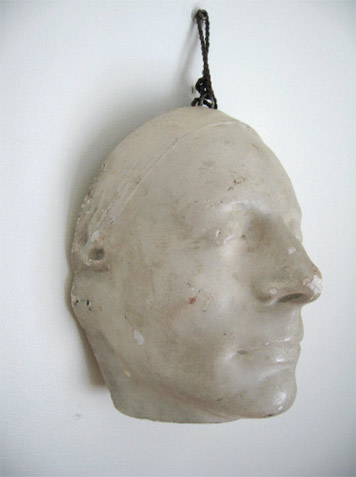
Baudelaire's death mask gathered dust for years on top of a tall bookshelf in the front hall of my childhood home in Jamaica Plain. When I was a teenager I scaled the shelf one day after school looking for a switchblade that my father, a minister, had once mentioned having confiscated from one of his parishioners. No such luck, but I did appropriate this chipped, tarnished plaster object and hung it above my bedroom desk. It has grimaced sightlessly down upon every desk I've had since.
I've kept the death mask for a perverse reason: Because it's the sort of thing one used to notice in the background of photographs of pretentious writers working at their desks. Under the mask's influence I once spent two impoverishing years slaving over a book about Baudelaire and other thinkers. Like Walter Benjamin, whose Arcades Project started out in more or less the same way, I couldn't finish it.
The poet and novelist Fanny Howe used to own my father's house; until recently I believed it was she who'd left the mask there. But now my father tells me not only that he doesn't know where we got it but also that he never told me whose face it was. After a little research I discovered that it's actually a life mask of Keats, from the original in London's National Portrait Gallery. So why did I think Baudelaire?
Perhaps I was influenced by a passage from one of Howe's novels that I read as a teenager. The protagonist, an ex-political activist turned poet, is asked by a former comrade, "On your death bed, will you be able to say, 'I helped the poor in their struggle for justice?' Or will you only be able to quote Baudelaire?" It's an unfair question, I know. But it's one that still haunts me.
This short essay is excerpted from Taking Things Seriously: 75 Objects with Unexpected Significance, a book by Joshua Glenn and Carol Hayes in which they and other writers discuss the importance of objects in their lives. This is the ninth essay in a series to appear on Design Observer.


Comments [8]
"Never mind..."
03.27.08
10:23
03.27.08
11:02
1 - blades make better stories than masks
2 - the Taking Things Seriously series seemingly holds no significance to this student's satisfaction (if you have a lisp I dare you to say that sentence and not laugh at yourself)
CFair
03.27.08
07:14
It wouldn't have worked if it was a switchblade form West Rox
03.27.08
11:05
From the literary side, something about Keats in death confounds the universe. There's your anecdote, and Joseph Severn put the wrong date of his death on the Italian tombstone (Keats died on Feb. 23, 1821, but the stone has Feb. 24). As though the universe was so unsettled by the death of such a spirit at 25, the details will never be right.
03.28.08
10:21
That question intrigues me as well, I'm glad the passage included it and that it is being shared here on Design Observer.
03.28.08
11:22
03.31.08
07:29
In response to: made happy by switchblade?
Yes!
Also, it is interesting the "facts" you learn as a young'n that can really influence your behaviors -- some of them you can test (like, no, that's the face of Keats) and some of them you can't.
Information and belief, who knows the difference?
04.02.08
10:42